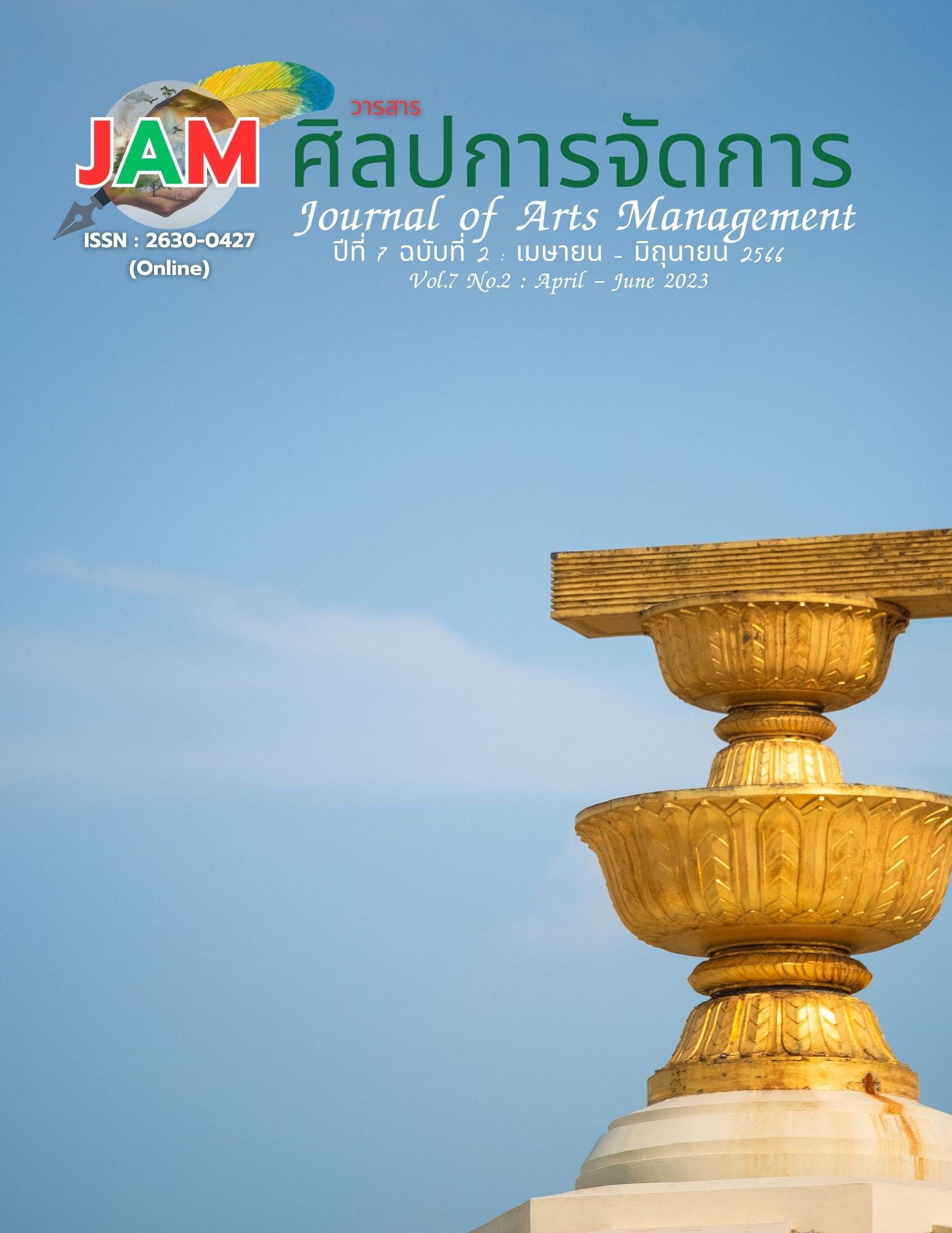A Development of Academic Affairs Management Model in the 21st Country of the Thai Cambodia border Schools under Chanthaburi Primary Educational Service Area Office 2
Main Article Content
Abstract
This research objective was to develop an academic affairs management model in the 21st century for the Thai Cambodian Border Schools. The study involves three steps: 1) To study the state and guidelines of academic affairs management in the 21st century 2) The creation and evaluation of academic affairs management in the 21st century model of the Thai Cambodian Border Schools; 3) The trial and evaluation of the possibility and utility of a model. The samples were 281 administrators, deputy directors of Educational Institutions and assistant directors of Educational Institutions. Head of the learning group and the basic education committee by stratified random sampling and nine experts. The research instruments were questionnaires, interviews, and evaluation forms. The statistical data analyses were mean, Standard deviation, and content analysis.
The research results were as follows: 1) The state of academic affairs management in the 21st century found that overall was at a high level and guidance and managed 8 aspects, 2) The academic affairs management in the 21st century model of the Thai Cambodian Border Schools under the Primary Educational Service Area Office 2 Chanthaburi consisted of 3 core components: 1. The academic affairs management model in the 21st century had 8 aspects: school curriculum; instruction and learning process development; education supervision; education measurement and evaluation; innovation media and educational technology; research and development; the develop for internal assurance system of schools; and development and promote give learning sources. 2. The academic affairs management process in the 21st century had 5 steps: planning, organizing, leading, evaluation and development, and 3. The promotion factors of the academic affairs management in the 21st century had 5 aspects; leadership, strategy management, school administrators and teachers, curriculum and instruction, and environment and climate for learning, 3) The evaluation results the possibility and utility of a model in overall were at the highest level.
Article Details

This work is licensed under a Creative Commons Attribution-NonCommercial-NoDerivatives 4.0 International License.
Views and opinions appearing in articles in the Journal of Arts of Management It is the responsibility of the author of the article. and does not constitute the view and responsibility of the editorial team I agree that the article is copyright of the Arts and Management Journal.
References
Alig-Mielcarek, J.M. (2003). A Model of School Success: Instructional Leadership, Academic Press, and Student Achievement. The Ohio State University.
Anannawee, P. (2002). Factors Affecting School Effectiveness. Elementary Education under the Office of the National Primary Education Commission[Doctoral Dissertation, Burapha University].
Artmak, T., Pimsan, N., & Punchakhetthikul, N. (2021) Development of a Systematic Approach Model of the Marginalized School under the Kanchanaburi Primary Educational Service Area Office 3. Journal of Buddhist Social Sciences and Anthropology, 8(2), 381-394.
Athamana, S. (2002). Organizational Behavior: Theory and Applications. Thammasat University.
Cronbach, L. J. (1970). Essentials of Psychological Testing (3rd ed.). Harper & Row.
Danthamrongkul, W. (2003). Administration. Third Wave Education.
Daft, R.L. (2000). Organization Theory and Design (7th ed). South-Western.
Forest, J.J., & Kinser, K. (2002). Higher Education in the United States, an Encyclopedia. ABC CLIO.
Fry, H., Ketteridge, S., & Marshall, S. (2009). A Handbook for Learning and Teaching in Higher Education: Enhancing Academic Practice (3rd ed.). Routledge.
Hongthong, P. (2019). Model of Academic Administration of Educational Institutions in Bangkok to Develop Self-Management Ability (Executive Function: EF) of Early Childhood Children. University of North Bangkok.
Hoy, W.K., & Miskel, C.G. (2001). Educational Administration, Theory, Research and Practices (6th ed.). McGraw Hall.
Jaisue, J., Anannawee, P., & Sittisomboon, M. (2021). Early Childhood Education Management in 21st Century Model of Private Schools in Chonburi Province. Journal of Buddhist Anthropology, 6(12), 376-392.
Jirangkorn, N., Gesthong, T., & Santawan, T. (2020). A Model of Academic Administration for Thailand 4.0 of Secondary Schools under the Provincial Administrative Organization. MBU Education Journal: Faculty of Education Mahamakut Buddhist University, 8(2), 81-93.
Klapan, P., & Khongthiang, S. (2002). Principles and Theories of Educational Administration. Ramkhamhaeng University.
Kleesunthorn, A. (2004). Administrative Strategies in the Era of Globalization. http://www.moe.go.th/main2/article/article_atipat/cyber_manage.htm.(2023,18May).
Khotprathuth, S. (2009). Principles and Theories of Educational Administration. Panyachon.
Lunenburg, F.C., & Ornstein, A. C. (2000). Educational Administration: Concepts and Practices. Wadsworth.
Mathuros, S. (2020). Online Education Management in the Era of NEW NORMAL COVID-19. Panyapiwat Institute of Management. Rajapark Journal, 15(40), 33-42.
Ministry of Education. (2003). National Education Act, B.E. 2542 (1999) Amendment (2nd ed). B.E. 2545 (2002). Teachers Council of Thailand.
Ministry of Education (2007). Ministerial Regulations on Prescribing Criteria and Methods of Decentralization of Administration and Education Management, B.E. 2550, Government Gazette. Vol. 124, Section 24. (16 May 2007).
Ministry of Education. (2007). Change Leadership Development Program to Support Decentralization for Educational Administrators and School Administrators. Teacher Development Institute Faculty and Educational Personnel.
Office of the Basic Education Commission. (2009). Guidelines for Measuring and Evaluating Learning Outcomes. According to the Basic Education Core Curriculum, 2008. Thailand Agricultural Cooperative Assembly Printing.
Office of the Basic Education Commission. (2020). Education in the Digital Age. https://www.posttoday.com/social/general/.
Office of the Secretariat of the Council of Education. (2014). Research Report on Thai Education Development and 21st Century Preparedness. Office of the Education Council Secretariat.
Phra Dhammakosajarn (Prayoon Dhammacitto). (2006). Buddhist Methods of Administration. Mahachulalongkornrajavidyalaya University.
Serirat, S. et al. (2002). Organization and Management. Thammasarn.
Srisawad, S. (2022). The Academic Administration Model in the 21st Century for Schools in Bangkok Metropolitan Administration. Rajapark Journal, 16(45), 586-601.
Pakdeephong, W., Metheevachatra, A., & Tongmun, W. (2022). Guidelines for Academic Administration in Schools in the Digital Era According to Sappurisadhamma 7 of Schools under the Kamphaeng Phet Secondary Educational Service Area Office. The Journal of
Research and Academics, 5(4), 241–254.
Wagner, III, J.A., & Hollenbeck, J.R. (1998). Organizational Behavior (3rd ed.). Prentice-Hall.
Yamane, T. (1976). Statistics: An Introductory Analysis (2nd ed.). Harper and Row.


